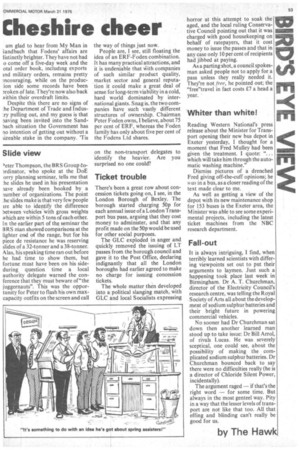Cheshire cheer
Page 55

If you've noticed an error in this article please click here to report it so we can fix it.
am glad to hear from My Man in iandbach that Fodens' affairs are list inctly brighter. They have not had o come off a five-day week and the otal order book, including exports tnd military orders, remains pretty mcouraging, while on the producion side some records have been 3roken of late. They're now also back within their overdraft limits.
Despite this there are no signs of he Department of Trade and Indus:ry pulling out, and my guess is that laving been invited into the Sand3ach situation the Government has lo intention of getting out without a sizeable stake in the company. 'Tis
Slide view
'eter Thompson, the BRS Group t o)rdinator, who spoke at the DoE orry planning seminar, tells me that he slides he used in his presentation lave already been booked by a lumber of organizations. The point .he slides make is that very few people ire able to identify the difference between vehicles with gross weights which are within 5 tons of each other. En the earlier part of the seminar the B RS Man showed comparisons at the lighter end of the range, but for his piece de resistance he was reserving slides of a 32-tonner and a 38-tonner. Alas, his speaking time ran out before he had time to show them, but fortune must have been on his sideduring question time a local authority delegate warned the conference that they must beware of "the juggernauts". This was the opportunity for Peter to flash his own maxcapacity outfits on the screen and call the way of things just now.
People are, I see, still floating the idea of an ERF-Foden combination. It has many practical attractions, and it is undeniable that With companies of such similar product quality, market sector and general reputation it could make a great deal of sense for long-term viability in a cold, hard world dominated by international giants. Snag is, the two companies have such vastly different structures of ownership. Chairman Peter Foden owns, I believe, about 75 per cent of ERF, whereas the Foden family has only about five per cent of the Fodens Ltd shares.
on the non-transport delegates to identify the heavier. Are you surprised no one could?
Ticket trouble
There's been a great row about concession tickets going on. I see, in the London Borough of Bexley. The borough started charging 50p for each annual issue of a London Transport bus pass, arguing that they cost money to administer, and that any profit made on the 50p would be used for other social purposes.
The GLC exploded in anger and quickly removed the issuing of LT passes from the borough council and gave it to the Post Office, declaring indignantly that all the London boroughs had earlier agreed to make no charge for issuing concession tickets.
The whole matter then developed into a political slanging match, with GLC and local Socialists expressing horror at this attempt to soak the aged, and the local ruling Conservative Council pointing out that it was charged with good housekeeping on behalf of ratepayers, that it cost money to issue the passes and that in any case only 10 per cent of recipients had jibbed at paying.
As a parting shot, a council spokesman asked people not to apply for a pass unless they really needed it. They're not free, he pointed out; the "free"travel in fact costs £7 a head a year.
Whiter than white!
Reading Western National's press release about the Minister for Transport opening their new bus depot in Exeter yesterday, I thought for a moment that Fred Mulley had been given the treatment. I quote: "... which will take him through the automatic washing machine."
Dismiss pictures of a drenched Fred giving off-the-cuff opinions; he WaS in a bus, as a closer reading of the text made clear to me.
As well as getting a view of the depot with its new maintenance shop for 153 buses is the Exeter area, the Minister was able to see some experimental projects, including the latest ticket machines from the NBC research department.
Fall-out
It is always intriguing, I find, when terribly learned scientists with differing viewpoints set out to put their arguments to laymen. Just such a happening took place last week in Birmingham. Dr A. T. Churchman, director of the Electricity Council's research centre, was telling the Royal Society of Arts all about the development of sodium sulphur batteries and their bright future in powering commercial vehicles.
No sooner had Dr Churchman sat down then another learned man stood up to take issue: Dr Bill Arrol, of rivals Lucas. He was severely sceptical, one could see, about the possibility of making the complicated sodium sulphur batteries. Dr Churchman bounced back to say there were no difficulties really (he is a director of Chloride Silent Power, incidentally).
The argument raged — if that's the right word — for some time. But always in the most genteel way. Pity in a way that the lesser levels of transport are not like that too. All that effing and blinding can't really be good for us.
by The Hawk








































































































































